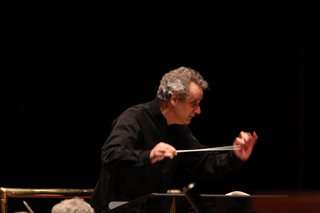|
Back
You Don’t Have to Be Jewish to Love Mostly Mozart New York
David Geffen Hall, Lincoln Center
07/31/2018 -
John Adams: Tromba lontana
Max Bruch: Violin Concerto No. 1 in G minor, Op. 26
Johannes Brahms: Symphony No. 2 in D major Op. 73
Joshua Bell (violin)
Mostly Mozart Festival Orchestra, Louis Langrée (conductor)

L. Langrée (© Mark Lyons)
“Brahms…with his extraordinarily compact compositions which aren’t at all obvious but reveal greater depth and richness of content the more you enter into them”
Gustav Mahler
“Hot town, summer in the city
Back of my neck getting dirty and gritty
Been down, isn’t it a pity
Doesn’t seem to be a shadow in the city
All around, people looking half dead
Walking on the sidewalk, hotter than a match head…”
The Lovin’ Spoonful
For many years now the Mostly Mozart Festival has been a welcome visitor to broiling New York when all other classical musicians are either on vacation or concertizing with summer music camps or bucolic festivals. The quality of the concerts has fluctuated over the years, but has certainly improved since the ascension of Louis Langrée as chief conductor. Anne Midgette, a former rising star at the New York Times and now at the Washington Post, wrote that when people lined up around the block to try and buy tickets for a Paavo Järvi concert, perhaps patrons were simply ready to embrace the classics once again and were tired of the, well let’s call it experimentation, of other events that pushed the more obscure and déclassé onto a public starved for the nourishment of the standard repertoire.
Max Bruch was a relatively minor 19th century German composer who wrote a piece entitled Kol Nidre that branded him as Jewish for the rest of his life. Not long after, both Gustav Mahler and Alexander von Zemlinsky converted to Catholicism (and Zemlinsky then later re-converted to Protestantism) to avoid the intense racism that would slam the doors of the major Teutonic concert halls and opera houses. There was just one little problem: Bruch was the son of a Protestant minister and remained in the faith of his ancestors throughout his life.
After the ubiquitous and inconsequential John Adams piece was over, Joshua Bell joined the party. Mr. Bell has been playing at this festival for a number of years, but he has never sounded better. His fiddling was just a bit more expansive than in earlier efforts and, wonder of wonders, the back-up sound and warmth of the orchestra was raised to a new level. We regulars tend to judge the MMF orchestra charitably, pointing out in many previous reviews that they are essentially a pick-up ensemble, even though there are veterans of many seasons intermixed into the crowd. This evening there was no need for charitability, as the group matched Mr. Bell in every pristine utterance, presenting this old potboiler in the best possible light. For an encore, Bell explained that it was the 20th anniversary of John Corigliano’s Red Violin and so presented a very colorful excerpt from the film’s score.
Since 2003, Maestro Louis Langrée has been striving to turn what was at best a mediocre ensemble into a first-class interpreter of the classics. Although one concert does not a career make, this effort went a long way into establishing a new standard of excellence. For years I was a manager for an international humanitarian organization and each day at lunchtime I closed my office door and listened to the Symphony No. 2 of Brahms (usually in a Bruno Walter version). This interval helped tremendously to center my thoughts, focus my emotions and make clear what is most important in my universe. It would be going a bit too far to state that this is the greatest piece of music ever written, but, for me, it is the most intimately significant. I have been attending Mostly Mozart for over twenty years now and so did not expect this current rendition to be the best that I have ever encountered, but I was quite pleasantly surprised at the result.
Although the opening Allegro non troppo was somewhat rushed – maestro not allowing his interesting sound to linger just a bit more – overall this was ear-catching music-making. Since I plead guilty to imposing a very high standard on the French horn players, it is only fair to point out in this case that they performed magnificently, the splendid melodies of Brahms experienced almost organically. This was essentially a light-hearted traversal of a masterpiece, but a refreshing and ear-catching one. Perhaps Mostly Mozart has finally arrived, however I will not get my hopes up too high just yet.
Fred Kirshnit
|